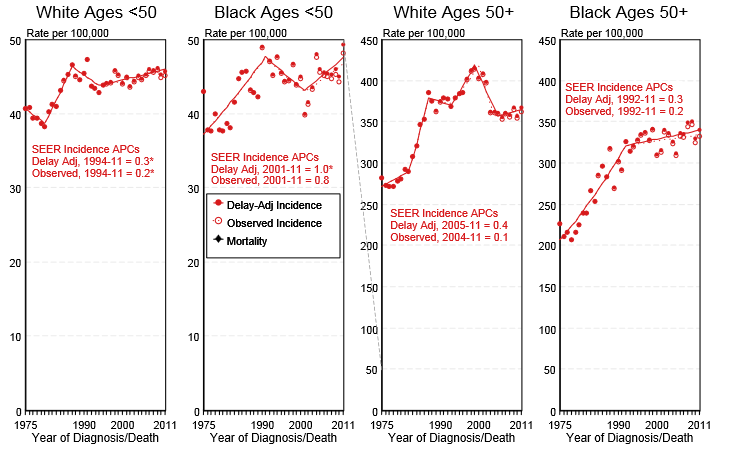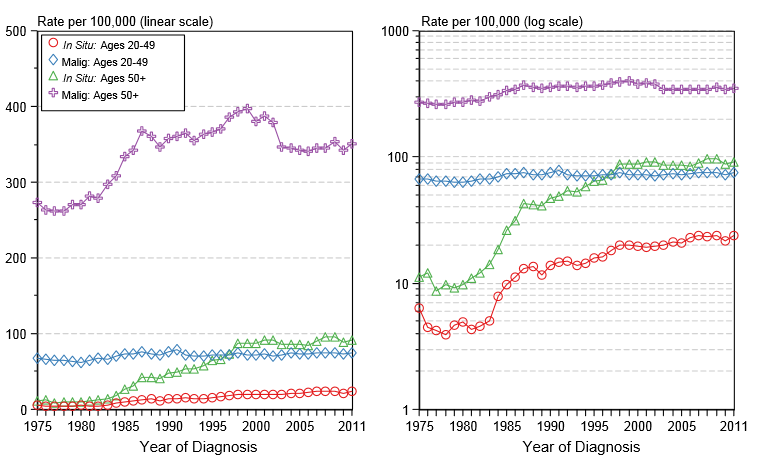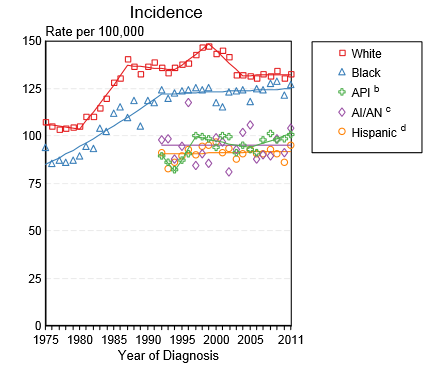Breast cancer epidemiology and demographics: Difference between revisions
Simran Singh (talk | contribs) No edit summary |
Simran Singh (talk | contribs) m (This was a simple edit, as there were only a few grammatical errors in regard to overall sentence structure.) |
||
| Line 10: | Line 10: | ||
* Worldwide, breast cancer is the fifth most common cause of cancer death (after [[lung cancer]], [[stomach cancer]], [[liver cancer]], and [[colon cancer]]).<ref name="who fact sheet">{{cite web |author=[[World Health Organization]] |month=February |year=2006 |title=Fact sheet No. 297: Cancer |url=http://www.who.int/mediacentre/factsheets/fs297/en/index.html |accessdate=2007-04-26}}</ref> In 2005, breast cancer caused 502,000 deaths (7% of cancer deaths; almost 1% of all deaths) worldwide.<ref name="who fact sheet"/> Among women worldwide, breast cancer is the most common cause of cancer death.<ref name="who fact sheet"/> | * Worldwide, breast cancer is the fifth most common cause of cancer death (after [[lung cancer]], [[stomach cancer]], [[liver cancer]], and [[colon cancer]]).<ref name="who fact sheet">{{cite web |author=[[World Health Organization]] |month=February |year=2006 |title=Fact sheet No. 297: Cancer |url=http://www.who.int/mediacentre/factsheets/fs297/en/index.html |accessdate=2007-04-26}}</ref> In 2005, breast cancer caused 502,000 deaths (7% of cancer deaths; almost 1% of all deaths) worldwide.<ref name="who fact sheet"/> Among women worldwide, breast cancer is the most common cause of cancer death.<ref name="who fact sheet"/> | ||
* In the United States, breast cancer is the third most common cause of cancer death (after lung cancer and colon cancer). In 2007, breast cancer | * In the United States, breast cancer is the third most common cause of cancer death (after lung cancer and colon cancer). In 2007, breast cancer caused approximately 40,910 deaths (7% of cancer deaths; almost 2% of all deaths) in the U.S.<ref name="acs cancer facts 2007">{{cite web |author=[[American Cancer Society]] |year=2007 |title=Cancer Facts & Figures 2007 |url=http://www.cancer.org/downloads/STT/CAFF2007PWSecured.pdf |accessdate=2007-04-26}}</ref> | ||
* Among women in the U.S., breast cancer is the most common cancer and the second- most common cause of cancer death (after lung cancer).<ref name="acs cancer facts 2007"/> Women in the U.S. have a 1 in 8 lifetime chance of developing invasive breast cancer and a 1 in 33 chance of breast cancer causing their death.<ref name="acs bc key stats">{{cite web |author=[[American Cancer Society]] |month=September 18, |year=2006 |title=What Are the Key Statistics for Breast Cancer? |url=http://www.cancer.org/docroot/CRI/content/CRI_2_4_1X_What_are_the_key_statistics_for_breast_cancer_5.asp |accessdate=2007-04-26}}</ref> A U.S. study conducted in 2005 by the Society for Women's Health Research indicated that breast cancer remains the most feared disease,<ref>{{cite press release |title=Women's Fear of Heart Disease Has Almost Doubled in Three Years, But Breast Cancer Remains Most Feared Disease | publisher=Society for Women's Health Research | date=2005-07-07 | url=http://www.womenshealthresearch.org/site/News2?page=NewsArticle&id=5459&news_iv_ctrl=0&abbr=press_ |accessdate=2007-10-15 }} | * Among women in the U.S., breast cancer is the most common cancer and the second- most common cause of cancer death (after lung cancer).<ref name="acs cancer facts 2007"/> Women in the U.S. have a 1 in 8 lifetime chance of developing invasive breast cancer and a 1 in 33 chance of breast cancer causing their death.<ref name="acs bc key stats">{{cite web |author=[[American Cancer Society]] |month=September 18, |year=2006 |title=What Are the Key Statistics for Breast Cancer? |url=http://www.cancer.org/docroot/CRI/content/CRI_2_4_1X_What_are_the_key_statistics_for_breast_cancer_5.asp |accessdate=2007-04-26}}</ref> A U.S. study conducted in 2005 by the Society for Women's Health Research indicated that breast cancer remains the most feared disease,<ref>{{cite press release |title=Women's Fear of Heart Disease Has Almost Doubled in Three Years, But Breast Cancer Remains Most Feared Disease | publisher=Society for Women's Health Research | date=2005-07-07 | url=http://www.womenshealthresearch.org/site/News2?page=NewsArticle&id=5459&news_iv_ctrl=0&abbr=press_ |accessdate=2007-10-15 }} | ||
</ref> even though [[heart disease]] is a much more common cause of death among women.<ref>{{cite web |url=http://www.nhlbi.nih.gov/health/hearttruth/press/infograph_dressgraph.pdf |title=Leading Causes of Death for American Women 2004 |accessdate=2007-10-15 |format=PDF |work=National Heart Lung and Blood Institute }}</ref> | </ref> even though [[heart disease]] is a much more common cause of death among women.<ref>{{cite web |url=http://www.nhlbi.nih.gov/health/hearttruth/press/infograph_dressgraph.pdf |title=Leading Causes of Death for American Women 2004 |accessdate=2007-10-15 |format=PDF |work=National Heart Lung and Blood Institute }}</ref> | ||
* The number of cases has significantly increased | * Since the 1970s, The number of cases has significantly increased, a phenomenon partly blamed on modern lifestyles in the Western world.<ref name=indy>{{cite news | ||
| last = Laurance | | last = Laurance | ||
| first = Jeremy | | first = Jeremy | ||
| Line 26: | Line 26: | ||
| date = 2006 | | date = 2006 | ||
| url = http://imaginis.com/breasthealth/statistics.asp | | url = http://imaginis.com/breasthealth/statistics.asp | ||
| accessdate = 2006-10-09 }}</ref> Because the breast is composed of identical tissues in males and females, breast cancer also occurs in males, | | accessdate = 2006-10-09 }}</ref> Because the breast is composed of identical tissues in males and females, breast cancer also occurs in males, although it is less common.<ref name=Dave>{{cite web | ||
| title = Male Breast Cancer Treatment - National Cancer Institute | | title = Male Breast Cancer Treatment - National Cancer Institute | ||
| work = [http://www.cancer.gov/ National Cancer Institute] | | work = [http://www.cancer.gov/ National Cancer Institute] | ||
| Line 33: | Line 33: | ||
| accessdate = 2006-10-16 }}</ref> | | accessdate = 2006-10-16 }}</ref> | ||
* In the United States, the age-adjusted [[prevalence]] of invasive breast cancer among males and females is 666.3 per 100,000 | * As evident in 2011, In the United States, the age-adjusted [[prevalence]] of invasive breast cancer among males and females is 666.3 per 100,000.<ref name="SEER">Howlader N, Noone AM, Krapcho M, Garshell J, Miller D, Altekruse SF, Kosary CL, Yu M, Ruhl J, Tatalovich Z,Mariotto A, Lewis DR, Chen HS, Feuer EJ, Cronin KA (eds). SEER Cancer Statistics Review, 1975-2011, National Cancer Institute. Bethesda, MD, http://seer.cancer.gov/csr/1975_2011/, based on November 2013 SEER data submission, posted to the SEER web site, April 2014.</ref> | ||
===Incidence=== | ===Incidence=== | ||
| Line 52: | Line 52: | ||
** 65 and over: 241.6 per 100,000 | ** 65 and over: 241.6 per 100,000 | ||
* Among females only, the overall age-adjusted [[incidence]] of invasive breast cancer in the United States between 2007 and 2011 is 124.5 per 100,000, whereas the age-adjusted [[incidence]] of invasive breast cancer by age category is:<ref name="SEER">Howlader N, Noone AM, Krapcho M, Garshell J, Miller D, Altekruse SF, Kosary CL, Yu M, Ruhl J, Tatalovich Z,Mariotto A, Lewis DR, Chen HS, Feuer EJ, Cronin KA (eds). SEER Cancer Statistics Review, 1975-2011, National Cancer Institute. Bethesda, MD, http://seer.cancer.gov/csr/1975_2011/, based on November 2013 SEER data submission, posted to the SEER web site, April 2014.</ref> | * Among females, only, the overall age-adjusted [[incidence]] of invasive breast cancer in the United States between 2007 and 2011 is 124.5 per 100,000, whereas the age-adjusted [[incidence]] of invasive breast cancer by age category is:<ref name="SEER">Howlader N, Noone AM, Krapcho M, Garshell J, Miller D, Altekruse SF, Kosary CL, Yu M, Ruhl J, Tatalovich Z,Mariotto A, Lewis DR, Chen HS, Feuer EJ, Cronin KA (eds). SEER Cancer Statistics Review, 1975-2011, National Cancer Institute. Bethesda, MD, http://seer.cancer.gov/csr/1975_2011/, based on November 2013 SEER data submission, posted to the SEER web site, April 2014.</ref> | ||
** Under 65 years: 81.7 per 100,000 | ** Under 65 years: 81.7 per 100,000 | ||
** 65 and over: 420.3 per 100,000 | ** 65 and over: 420.3 per 100,000 | ||
| Line 103: | Line 103: | ||
===Percent Distribution of Breast Cancer by Histology=== | ===Percent Distribution of Breast Cancer by Histology=== | ||
* Among patients with histologically confirmed cases of breast cancer, the percent distribution of the types of the disease between 2007 and 2011 in the United States | * Among patients with histologically confirmed cases of breast cancer, the percent distribution of the types of the disease between 2007 and 2011 in the United States is:<ref name="SEER">Howlader N, Noone AM, Krapcho M, Garshell J, Miller D, Altekruse SF, Kosary CL, Yu M, Ruhl J, Tatalovich Z,Mariotto A, Lewis DR, Chen HS, Feuer EJ, Cronin KA (eds). SEER Cancer Statistics Review, 1975-2011, National Cancer Institute. Bethesda, MD, http://seer.cancer.gov/csr/1975_2011/, based on November 2013 SEER data submission, posted to the SEER web site, April 2014.</ref> | ||
====Invasive Breast Cancer==== | ====Invasive Breast Cancer==== | ||
Revision as of 00:53, 22 July 2015
|
Breast Cancer Microchapters |
|
Diagnosis |
|---|
|
Treatment |
|
Case Studies |
|
Breast cancer epidemiology and demographics On the Web |
|
American Roentgen Ray Society Images of Breast cancer epidemiology and demographics |
|
Risk calculators and risk factors for Breast cancer epidemiology and demographics |
Editor-In-Chief: C. Michael Gibson, M.S., M.D. [1]; Assistant Editor(s)-In-Chief: Jack Khouri; Rim Halaby, M.D. [2]
Overview
Worldwide, breast cancer is the fifth most common cause of cancer death (after lung cancer, stomach cancer, liver cancer, and colon cancer).[1] In 2005, breast cancer caused 502,000 deaths (7% of cancer deaths; almost 1% of all deaths) worldwide.[1] In the United States, breast cancer is the third most common cause of cancer death (after lung cancer and colon cancer). In 2007, breast cancer caused approximately 40,910 deaths (7% of cancer deaths; almost 2% of all deaths) in the U.S.[2] Among women worldwide, breast cancer is the most common cause of cancer death.[1] Among women in the U.S., breast cancer is the most common cancer and the second- most common cause of cancer death (after lung cancer).[3] Women in the U.S. have a 1 in 8 lifetime chance of developing invasive breast cancer and a 1 in 33 chance of breast cancer causing their death.[4]
Epidemiology and Demographics
Prevalence
- Worldwide, breast cancer is the fifth most common cause of cancer death (after lung cancer, stomach cancer, liver cancer, and colon cancer).[1] In 2005, breast cancer caused 502,000 deaths (7% of cancer deaths; almost 1% of all deaths) worldwide.[1] Among women worldwide, breast cancer is the most common cause of cancer death.[1]
- In the United States, breast cancer is the third most common cause of cancer death (after lung cancer and colon cancer). In 2007, breast cancer caused approximately 40,910 deaths (7% of cancer deaths; almost 2% of all deaths) in the U.S.[3]
- Among women in the U.S., breast cancer is the most common cancer and the second- most common cause of cancer death (after lung cancer).[3] Women in the U.S. have a 1 in 8 lifetime chance of developing invasive breast cancer and a 1 in 33 chance of breast cancer causing their death.[4] A U.S. study conducted in 2005 by the Society for Women's Health Research indicated that breast cancer remains the most feared disease,[5] even though heart disease is a much more common cause of death among women.[6]
- Since the 1970s, The number of cases has significantly increased, a phenomenon partly blamed on modern lifestyles in the Western world.[7][8] Because the breast is composed of identical tissues in males and females, breast cancer also occurs in males, although it is less common.[9]
- As evident in 2011, In the United States, the age-adjusted prevalence of invasive breast cancer among males and females is 666.3 per 100,000.[10]
Incidence
Invasive Breast Cancer
- The delay-adjusted incidence of invasive breast cancer in 2011 was estimated to be 69.56 per 100,000 male and female persons in the United States.[10]
- In 2011, the age-adjusted incidence of invasive breast cancer was 130.87 per 100,000 females in the United States.[10]
In-Situ Breast Cancer
- The delay-adjusted incidence of in-situ breast cancer in 2011 was estimated to be 35.72 per 100,000 females in the United States.[10]
- In 2011, the age-adjusted incidence of in-situ breast cancer was 35.54 per 100,000 females in the United States.[10]
Age
Invasive Breast Cancer
- While the overall age-adjusted incidence of invasive breast cancer among males and females in the United States between 2007 and 2011 is 67.1 per 100,000, the age-adjusted incidence of invasive breast cancer by age category is:[10]
- Under 65 years: 41.9 per 100,000
- 65 and over: 241.6 per 100,000
- Among females, only, the overall age-adjusted incidence of invasive breast cancer in the United States between 2007 and 2011 is 124.5 per 100,000, whereas the age-adjusted incidence of invasive breast cancer by age category is:[10]
- Under 65 years: 81.7 per 100,000
- 65 and over: 420.3 per 100,000
- Shown below is an image depicting the incidence of breast cancer by age and race in the United States between 1975 and 2011.[10]
In-Situ Breast Cancer
- Among females only, the overall age-adjusted incidence of in-situ breast cancer in the United States between 2007 and 2011 is 31.7 per 100,000, whereas the age-adjusted incidence of invasive breast cancer by age category is:[10]
- Under 65 years: 23.6 per 100,000
- 65 and over: 87.7 per 100,000
- Shown below is an image depicting the incidence of in-situ versus invasive breast cancer in females in the United States between 1975 and 2011.
Gender
- In the United States, the age-adjusted prevalence of invasive breast cancer by gender in 2011 is:[10]
- In males: 8.3 per 100,000
- In females: 1222.3 per 100,000
Race
- Shown below is a table depicting the age-adjusted prevalence of invasive breast cancer by race in females and males in 2011 in the United States.[10]
| All Races | White | Black | Asian/Pacific Islander | Hispanic | |
| Age-adjusted prevalence | 666.3 per 100,000 | 700.1 per 100,000 | 592.9 per 100,000 | 510.9 per 100,000 | 460.5 per 100,000 |
- Shown below is a table depicting the age-adjusted prevalence of invasive breast cancer by race in females in in 2011 in the United States.[10]
| All Races | White | Black | Asian/Pacific Islander | Hispanic | |
| Age-adjusted prevalence | 1222.3 per 100,000 | 1300.2 per 100,000 | 1026.1 per 100,000 | 916 per 100,000 | 835.9 per 100,000 |
- Shown below is an image depicting the incidence of breast cancer by race in the United States between 1975 and 2011.[10]
API: Asian/Pacific Islander; AI/AN: American Indian/ Alaska Native
Percent Distribution of Breast Cancer by Histology
- Among patients with histologically confirmed cases of breast cancer, the percent distribution of the types of the disease between 2007 and 2011 in the United States is:[10]
Invasive Breast Cancer
- Carcinoma: 99.4%
- Adenocarcinoma: 97.4%
- Adenocarcinoma not otherwise specified: 0.8%
- Infiltrating duct carcinoma: 73%
- Lobular carcinoma: 8.9%
- Inflammatory adenocarcinoma: 0.4%
- Infiltrating duct mixed and infiltrating lobular mixed: 9.4%
- Mucinous adenocarcinoma: 2%
- Tubular adenocarcinoma: 0.7%
- Papillary adenocarcinoma: 0.6%
- Paget disease: 0.5%
- Other adenocarcinoma: 1.2%
- Other specific carcinoma: 0.8%
- Medullary carcinoma: 0.3%
- Unspecified carcinoma: 1.2%
- Adenocarcinoma: 97.4%
- Sarcomas and other soft tissue tumors: 0.1%
- Other specific types: 0.3%
- Phyllodes malignant tumor: 0.2%
- Unspecified: 0.2%
In-Situ Breast Cancer
- Ductal carcinoma in situ: 84.6%
- Cribiform carcinoma in situ: 8.4%
- Ductal carcinoma in situ, solid type: 6.5%
- Ductal carcinoma in situ, not other wise specified: 31.1%
- Comedocarcinoma in situ: 7.9%
- Ductal carcinoma in situ, papillary: 1.6%
- Non infiltrating intracystic carcinoma: 0.4%
- Ductal carcinoma in situ, micropapillary: 2%
- Intraductal with other types of carcinoma in situ: 26.5%
- Lobular carcinoma in situ: 11.4%
- Intraductal and lobular carcinoma in situ: 3.1%
- Other: 0.2%
References
- ↑ 1.0 1.1 1.2 1.3 1.4 1.5 World Health Organization (2006). "Fact sheet No. 297: Cancer". Retrieved 2007-04-26. Unknown parameter
|month=ignored (help) - ↑
- ↑ 3.0 3.1 3.2 American Cancer Society (2007). "Cancer Facts & Figures 2007" (PDF). Retrieved 2007-04-26.
- ↑ 4.0 4.1 American Cancer Society (2006). "What Are the Key Statistics for Breast Cancer?". Retrieved 2007-04-26. Unknown parameter
|month=ignored (help) - ↑ "Women's Fear of Heart Disease Has Almost Doubled in Three Years, But Breast Cancer Remains Most Feared Disease" (Press release). Society for Women's Health Research. 2005-07-07. Retrieved 2007-10-15.
- ↑ "Leading Causes of Death for American Women 2004" (PDF). National Heart Lung and Blood Institute. Retrieved 2007-10-15.
- ↑ Laurance, Jeremy (2006-09-29). "Breast cancer cases rise 80% since Seventies". The Independent. Retrieved 2006-10-09.
- ↑ "Breast Cancer: Statistics on Incidence, Survival, and Screening". Imaginis Corporation. 2006. Retrieved 2006-10-09. External link in
|work=(help) - ↑ "Male Breast Cancer Treatment - National Cancer Institute". National Cancer Institute. 2006. Retrieved 2006-10-16. External link in
|work=(help) - ↑ 10.00 10.01 10.02 10.03 10.04 10.05 10.06 10.07 10.08 10.09 10.10 10.11 10.12 10.13 Howlader N, Noone AM, Krapcho M, Garshell J, Miller D, Altekruse SF, Kosary CL, Yu M, Ruhl J, Tatalovich Z,Mariotto A, Lewis DR, Chen HS, Feuer EJ, Cronin KA (eds). SEER Cancer Statistics Review, 1975-2011, National Cancer Institute. Bethesda, MD, http://seer.cancer.gov/csr/1975_2011/, based on November 2013 SEER data submission, posted to the SEER web site, April 2014.


